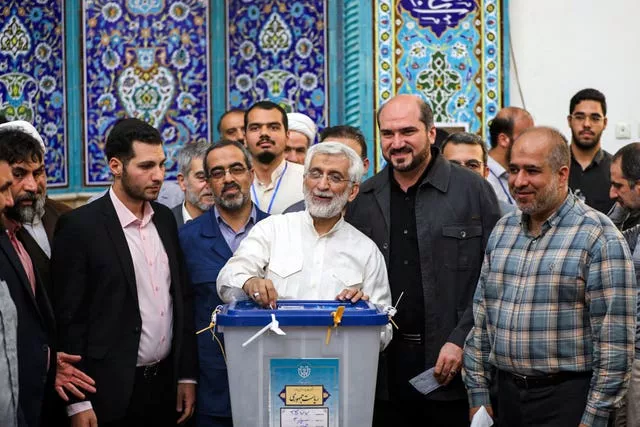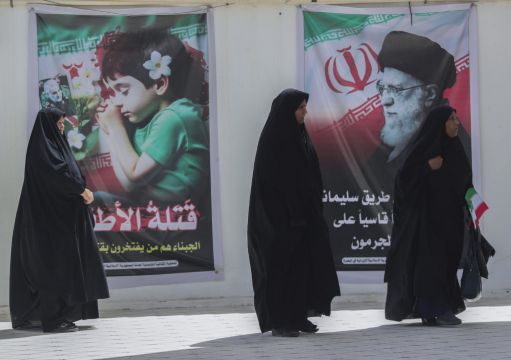Iran will hold a run-off presidential election to replace the late hard-line president Ebrahim Raisi, an official said, after an initial vote saw the top candidates fail to secure an outright win.
The run-off election on Friday will pit reformist candidate Masoud Pezeshkian against the hard-line former nuclear negotiator Saeed Jalili.
Mohsen Eslami, an election spokesman, announced the result in a news conference carried by Iranian state television.
He said of 24.5 million votes cast, Mr Pezeshkian got 10.4 million while Mr Jalili received 9.4 million.

Parliament speaker Mohammad Bagher Qalibaf got 3.3 million, while Shiite cleric Mostafa Pourmohammadi had more than 206,000 votes.
Iranian law requires that a winner gets more than 50% of all votes cast. If not, the race’s top two candidates will advance to a run-off a week later.
There has been only one run-off presidential election in Iran’s history – in 2005, when hard-liner Mahmoud Ahmadinejad beat former president Akbar Hashemi Rafsanjani.
Mr Eslami acknowledged the country’s Guardian Council would need to offer formal approval, but the result did not draw any immediate challenge from contenders in the race.
As has been the case since the 1979 Islamic Revolution, women and those calling for radical change have been barred from running, while the vote itself will have no oversight from internationally recognised monitors.
There were signs of the wider disenchantment of the public with the vote.

More than one million votes were voided, according to the results, typically a sign of people feeling obligated to cast a ballot but not wanting to select any of the candidates.
The overall turnout was 39.9%, according to the results.
The 2021 presidential election that elected Mr Raisi saw a 42% turnout, while the March parliamentary election saw a 41% turnout.
There had been calls for a boycott, including from imprisoned Nobel Peace Prize laureate Narges Mohammadi. Mir Hossein Mousavi, one of the leaders of the 2009 Green Movement protests who remains under house arrest, has also refused to vote along with his wife, his daughter said.
There has also been criticism that Mr Pezeshkian represents just another government-approved candidate.
In a documentary on the reformist candidate aired by state TV, one woman said her generation was “moving towards the same level” of animosity with the government that Mr Pezeshkian’s generation had in the 1979 revolution.

Mr Raisi, 63, died in the May 19 helicopter crash that also killed the country’s foreign minister and others. He was seen as a protege of Iran’s Supreme Leader Ayatollah Ali Khamenei and a potential successor.
Still, many knew him for his involvement in the mass executions that Iran conducted in 1988, and for his role in the bloody crackdowns on dissent that followed protests over the death of Mahsa Amini, a young woman detained by police over allegedly improperly wearing of the mandatory headscarf, or hijab.
The voting came as wider tensions have gripped the Middle East over the Israel-Hamas war in the Gaza Strip.
In April, Iran launched its first-ever direct attack on Israel over the war in Gaza, while militia groups that Tehran arms in the region – such as the Lebanese Hezbollah and Yemen’s Houthi rebels – are engaged in the fighting and have escalated their attacks.
Meanwhile, the Islamic Republic continues to enrich uranium at near weapons-grade levels and maintains a stockpile large enough to build – should it choose to do so – several nuclear weapons.
Despite the recent unrest, there was only one reported attack around the election.







